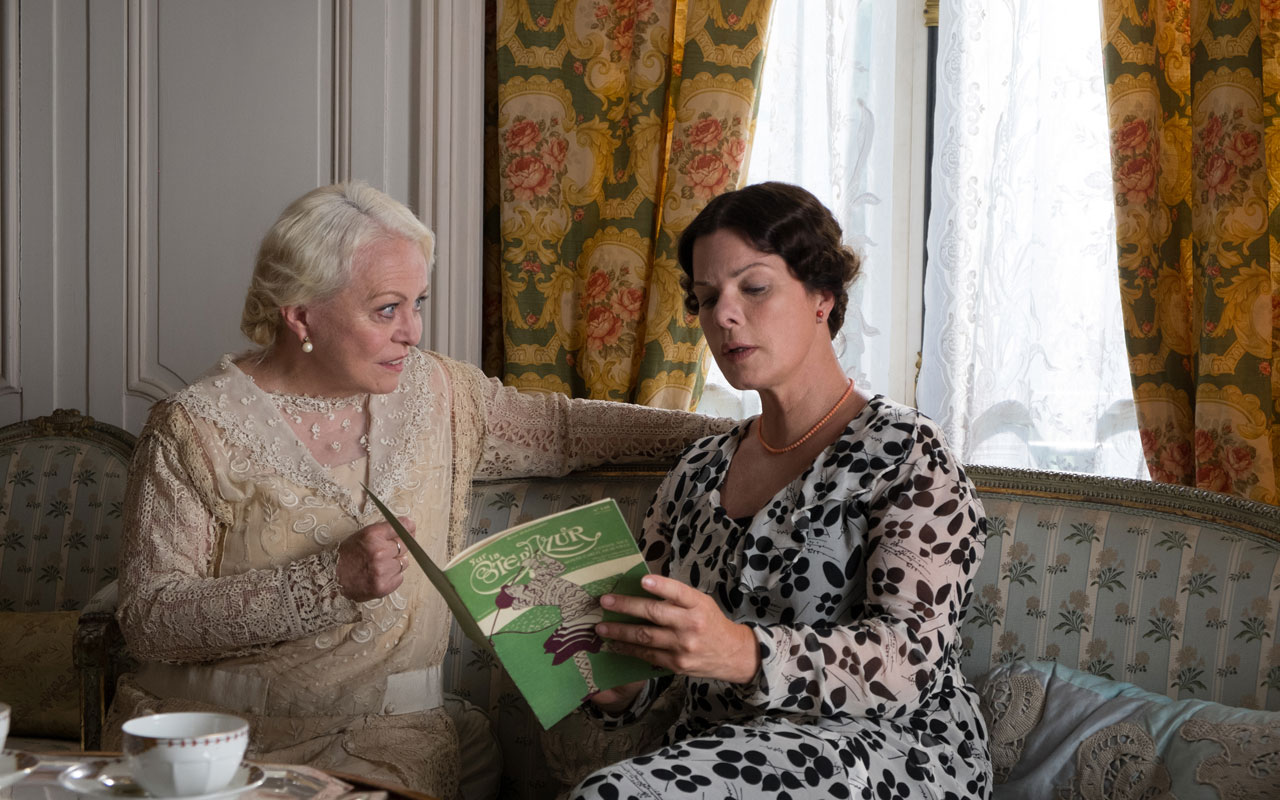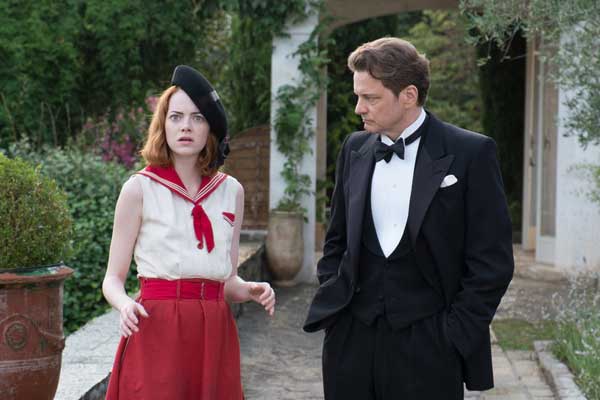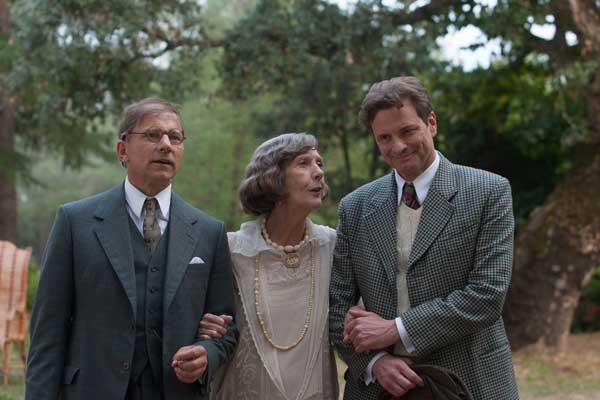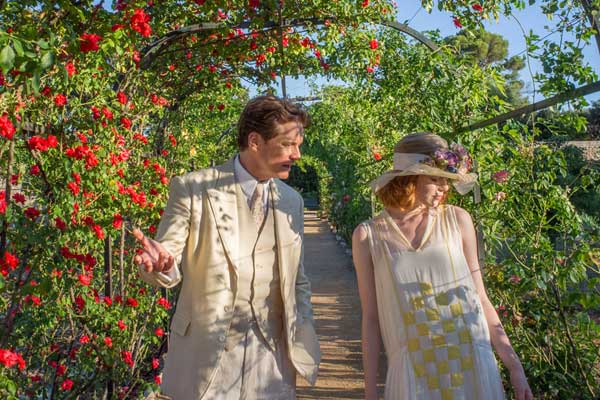Woody Allen, Colin Firth & Jacki Weaver Talk 'Magic in the Moonlight'
- Details
- Category: Interviews
- Created: Friday, 25 July 2014 00:37
- Published: Friday, 25 July 2014 08:19
- Written by Justine Browning
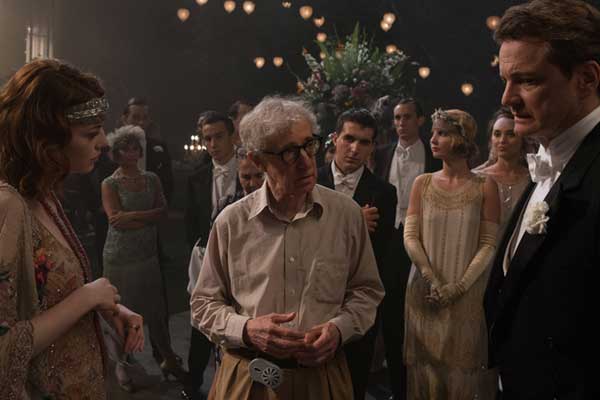
Over the last four decades, director Woody Allen has explored both the humorous and dark side of romance while utilizing a breathtaking array of locations. His latest release combines all of these elements. Set in 1920's Southern France, MAGIC IN THE MOONLIGHT stars Colin Firth as a magician who is determined to expose a popular medium (Emma Stone) as a fraud.
At the NY press conference for the Woody Allen film, the director, Colin Firth and Jacki Weaver discussed illusion versus reality, films as an escape, shooting a film set in the past and collaborating with one another.
Q: Can you tell us about the genesis of the film?
Woody Allen: Magic has always been of great interest to me. I was an amateur magician when I was younger. I’d practice and read up on it a lot. I’m well aware of the history of magic. In the 1920’s there was great vogue in fraudulent spiritualism in the United States and abroad. There was a lot of people exploiting the public with seances and fake mind reading. They were very good at it -- they could fool the general public, intellectuals, scientists, doctors and the educated. But they could not fool magicians. The tricks they were using were known to magicians.
A number of magicians, Houdini among them, would debunk and expose them, because they were fraudulently deceiving the public and stealing from them. I thought it would make an interesting romance between a fraudulent little mystic and a magician who has a much more sober view of the world. Houdini had a very hopeful, but grim view of the world. The ideas developed rapidly after that.
Q: Colin can you tell us about your view of Stanley? This is a guy who is very intelligent and knows it. He has unlikable traits. Are you sympathetic to his worldview?
Colin Firth: I don’t think he’s a single-faceted character. The trouble with being the smartest person in the room and knowing it, is that you’re probably missing something. One theme that has been coming is that absolute certainty is a rather precarious position. A wonderful thing about making a film or any drama is that you have dialogue. You can take up a position, and have another character take up a completely other position.
Oscar Wilde said he liked writing dialogue so much because you can argue with yourself. If you just want to say something about your position in the world you can just say it, you don’t have to spend ninety minutes of screen time. Stanley’s less appealing qualities are largely setups for a fall -- which is part of the entertainment.
Q: There’s some mystique about how Mr. Allen casts his films. Jacki, did the reality of the way the casting transpired in your case live up to what you’d heard about his process?
Jacki Weaver: I feel I’ve known Mr. Allen for forty years because I used to plagiarize his standup as a teenager. He didn’t know that. I’m going to get sued. So it was a totally surreal experience to meet him and be part of his next film. I thought it was a hoax at first. Every now and then I’d be on set and I’d see him sitting at his director’s chair, watching the monitor, and I’d think ‘I can’t believe this is happening’.
Q: Mr. Allen can you speak about the casting process for this film? Emma, Colin and Jacki are all new to your work.
Woody Allen: The hardest part to find was Colin’s part. You needed someone with enormous elegance. Being able to play that role and deliver that role is not an easy role to fill. There are very, very few people who could do it. Colin was our first choice, we were determined to have him. He was scheduled to do another project. Fortunately for us, his other project was postponed. There was a list of other people, who I won’t mention now, but there was an enormous drop in what we’d hoped for. Colin was the perfect person to play this. The part requires a certain savoire-faire. Someone who has that attitude without getting on your nerves.
Emma, I had just seen on the treadmill. She had done some movies that I’d never seen, but I was on the treadmill and suddenly I would see five minutes of this or that and I’d think whose this girl in these adolescent, or post-adolescent type movies? She’s beautiful and very good. I mentioned her name to Juliet Taylor who does casting for my films and she said ‘yes, she’s not just a pretty face, she’s a very good actress’. She was very intelligent to chat with and I cast her. She is in the movie that I am doing now. She happens to be right for the part, but I was thrilled to be working with her. Jacki I had seen briefly in a movie and I liked her very much. As soon as I met her I wanted her. And then I thought it was a hoax. I met her for the first time in my screening room, but as soon as she left I knew we wanted her.
Q: Your last three films have been among the most financially successful of your filmography. Is there any rhyme or reason why some are hits and some are not?
Woody Allen: Pure accident. You make a film and always hope you’ll make "Citizen Kane" or "The Bicycle Thief." For one reason or another one clicks and one doesn’t but it’s out of your control completely. Sometimes the critics will like a film, and the public doesn’t come. Sometimes the critics don’t like the film and the public will come. It’s completely spontaneous. It’s a hazard. You just make the one that you enjoy making at the time and you think people may enjoy the story. It’s just luck.
Q: Colin, your first time with Woody you’ve avoided what people call the ‘Woody Stand-In Role’ imitating his rhythms, speech and mannerisms. Can you talk about your preparation for the role? Did you study magic at all?
Colin Firth: It wouldn’t have been a fit. The role didn’t call for that. Stanley was a wonderfully specific character who belonged in that culture. When I was preparing for the role I found myself reading P.G. Wodehouse and Shaw, just to refresh myself as to how people sound. That way of speaking has disappeared to a large extent. It really struck me how remarkably Woody hit it. I play it how I see it, or hear it. When dialogue and relationships are good, the work is just done for you, it comes to life. If I’d misjudged that I had Woody to make what was intended clearer.
Magic would have been a lost cause for me. Closeup magic is an art form that is very hard to achieve. I might as well have done a crash course in being a concert pianist. I can’t do it. To achieve it, you’re practicing every waking hour of the day. There was a moment when I was asked to attempt the simplest possible card trick. It was the closest I think we got to reaching Woody’s patience threshold. Only a little sigh at my eighth attempt to do this little thing with one card. I dropped it. That didn’t make the final cut.
Q: You’ve said ‘I make escapist films, but it’s not the audience that escapes, it’s me’. A similar description is used in the film with Firth’s character, that he is an escape artist looking to escape reality. I was wondering if working on this film and the next have served that purpose as being your means of escapism over the last few months as the reality of the present has been less idealized than this fantasy of the past?
Woody Allen: I’ve been escaping my whole life. Every since I was a little child I’ve been escaping to the movies on the other side, as an audience member. I’d sit in the movies all day long. When I got older I escaped into the world of unreality by making movies. When I get up in the morning I work with beautiful women and charming men, funny comedians, dramatic artists. I’m presented with costumes, great music to choose from, and sets. So, my whole year for my whole life I’ve been living in a bubble and I like it. I prefer the magic to reality and have since I was five years old. Hopefully I can continue to make films and constantly escape into them.
Q: Mr. Allen and Mr. Firth can you discuss working with Eileen Atkins?
Woody Allen: It was great. I’d only seen her once in my life in a play with John Lithgow and I thought she was fabulous. And then when we were casting, Juliet Taylor said ‘What about Eileen Atkins?’ She was available and it was a treat to work with her. I never had to say anything to her or direct her, she just came in and did it. She has that wonderful elderly stage presence.
Q: Mr. Firth you’ve worked with her several times. How is that relationship?
Colin Firth: She’s become a great friend of mine. There’s no better actor. I saw at the play she wrote, it was a magnificent achievement. She is a delight, she brings an intelligence. In some ways I’d like to the think the relationship you see in the film is not a million miles away from the relationship we have in reality.
Q: Why your protagonists always tend to be neurotic ones who feel that life is meaningless?
Woody Allen: I firmly believe, and I don’t say this as a criticism, that life is meaningless. I’m not alone in thinking this. There have been many great minds far, far superior to mine, that have come to that conclusion. And unless somebody can come up with some proof or some example where it’s not, I think it is. I think it’s a lot of sound and fury signifying nothing, and that’s just the way I feel about it.
I’m not saying that one should opt to kill oneself But the truth of the matter is, when you think of it, every let's say 100 years, there’s a big flush, and everybody in the world is gone. And there’s a new group of people. And then that gets flushed, and there’s a new group of people. And this goes on and on interminably — and I don’t want to upset you — toward no particular end, no rhyme or reason.
And the universe, as you know from the best of physicists, is coming apart, and eventually there will be nothing, absolutely nothing. All the great works of Shakespeare and Beethoven and Da Vinci -- all that will be gone. Now, not for a long time, but gone. Much shorter than you think, really, because the sun is going to burn out much earlier than the universe vanishes, so you don’t have to wait for the universe to vanish. It’ll happen earlier than that. So all this achievement, all these Shakespearean plays and the symphonies, the height of human achievement, will be gone completely. There will be nothing, absolutely nothing: no time, no space, nothing at all. Just zero.
So what does it really mean to get exercised over trivial problems? That's why over the years I've never written or made movies about political things; because while they do have current critical importance, in the large, large scheme of things, you know, only big questions matter. And the answers to those big questions are very, very depressing. What I would recommend -- this is the solution that I've come up with -- is distraction.
That's all you can do. You can get up. You can be distracted by your love life, by the baseball game, by the movies, by the nonsense: Can I get my kid into this private school? Will this girl go out with me Saturday night? Can I think of an ending for the third act of my play? Am I going to get the promotion in my office? All this stuff, but in the end the universe burns out. So I think it's meaningless. And to be honest, my characters portray this feeling. Have a good weekend.
I think it's the artist's job to try and find some solution or some reason to accept things. But grimmest reality...that you're born, you die, you suffer, it's to no purpose and you're gone forever, ever, ever...that to find a good way to cope with that. ...the best that I can offer is distraction. ... There’s a story of two filmmakers. One filmmaker makes films that are deep,intellectual, profound and confrontational. The other makes purely vacuous escapist films.
I'm not sure if the one who makes escapist films makes the deeper contribution.
The artist can't give you an answer to the dreadful reality of your existence. It’s like drink a cold lemonade on a hot day. You’re refreshed. Then you walk out into the terrible heat, and you can take it for a few hours more. That is the only thing I can think of the artist doing. The artist cannot give you a satisfying answer to the dreadful reality of human existence. So, the best you can can do is maybe entertain people, and refresh them for an hour and a half. Then they can go on and meet the onslaught...till somebody else picks them up again.
Q: Jacki, you’ve had an extensive stage career. Do you find yourself leaning now towards the film industry after your 2011 Oscar Nomination? Do you still have that spark for the theater?
Jacki Weaver: Film is more of a novelty, because I have done so much theater over the last 52 years. I’m in love with making movies at the moment. Also, I find it easier at my age to remember three minutes of dialogue, than three hours. You need a lot of stamina to do eight shows a week. You need a lot to be a film actor, too, but it is a different discipline. Film is easier for an elderly person like myself.
Q: What was your best day working with Emma Stone?
Colin Firth: One of my favorite scenes in the film was being wet in the conservatory [with Emma]. There was a great satisfaction, that we’d done something worth while. Also -- I think it was probably dull for Woody -- but driving that car for miles, and not really having to do much acting. I was in delightful company.
Q: This film is a lot about reality VS Illusion. Particularly love and the reality of love. In the 1920’s as an Era was very much about illusion, in contrast to the 1930’s, with the economic devastation. Was this ever in the back of your mind?
Woody Allen: I’m all for illusion. For me, reality is a painful grind. I think it is for everybody, regardless of being rich or poor. I’m going to quote myself here ‘we all know the same truth, our lives depend on how we choose to distort it’. In Purple Rose of Cairo it’s all about reality and illusion, and how much better illusion is. The problem is that in that movie Mia Farrow had to choose between reality and illusion. She chose reality -- because if you opt for illusion, it’s crazy. You can’t, you’ll go mad.
The same thing is in [Magic in the Moonlight]. Colin works as an illusionist. The only thing that can possibly save us from the plight that we are all in is some kind of magic. Unless that happens, it’s a grim situation. The 1920’s, for me, is flappers, beautiful cars, jazz music, bootleggers -- a different way of life. Time creates an illusion. I’m sure if you lived there at the time it wasn’t so great. Now one can soften it and make it into whatever you want. I often set films in the past to create illusion in a more tantalizing way.
Colin Firth: I think what Woody said was perfect. Particularly if you are in any creative practice. You interpret it, or distort it. It’s your take, your twist. I also think it’s interesting what Woody said about the filmmaker who provides escapist entertainment. That he’s making a greater contribution than the one who confronts things.
Levity, lightness, escapism and diversion is often misjudged, undervalued, and underrated as an art form. Comedy, from the start, is saying ‘don’t take me seriously’. People who hand out awards and write essays on artistic work -- they take it at face value, less seriously. On the whole I think it is an awful lot harder to pull off, but life would be unthinkable without it.
Jacki Weaver: This has made me think of a half-baked theory I’ve had for years, that, since we actors pretend for a living, perhaps we get it all off our backs. Maybe some of us have a greater grasp of reality because of our work. It is half-baked, isn’t it?
Q: Colin’s character undergoes a large change in the film. What was your approach to keeping that honesty there? The concern is that audience members would not be able to connect with such a sarcastic character, as he is in the start.
Woody Allen: Throughout history, in theater and film, people do like sarcastic characters. They like curmudgeons, if they’re amusing, despite being vitriolic. Especially if they represent the right thin -- if they’re decent human beings. They could be annoyed with the duplicity, the phoniness of the world. Holden Caulfield by Salinger. Or TheMan Who Came to Dinner in George Kaufman’s play.
Colin’s character wants nothing more than to be wrong. He wants to find out that there is more to life, that he is wrong, and that Emma is write that there are unknown, magical, and amazing things. That we don’t have all the answers, but the truth is that pretty much all you see if all you get. As soon as he sees that there may be more to life, he sees purpose, underlying meaning, it changes him completely. He smells the flowers and loves everything. His life has changed.
I was once on a TV panel with Billy Graham. I asked ‘what if when you die, you figure out that I was right, and there is nothing?’ and he said, quite correctly: ‘I will still have had a better life than you’. And he’s right. I will have had a life riddled with anxiety, doubt, questions. He’d have gone through life protected, happy and sure of things.
So, Colin’s character wants nothing more than to be changed. You want to be able to say to yourself ‘what I see is what I get’ and the results are not that good, but I still want to create a life with some reason to be affirmative. It’ not easy, but it has to be done without self deception. Only when Colin is deceived is he happy. When he is not deceived the best he can hope for is the same grim reality with an occasional oasis here and there. One of those oasis’ is Emma. Being in love with her does give some little respite from the terrible world, it’s comforting.
Q: In 1968 you said you had no burning desire to be a director. You just wanted to be funny. How has that changed? Also, the finale of the film is reminiscent of the screen version of Pygmalion. Were you influenced by George Bernard Shaw at all?
Woody Allen: No, but I will say that Pygmalion is the best comedy ever written. It’s perfect. But for this film I was thinking of Houdini exposing mediums. In 1968 when I started directing films I was only directing to protect my own jokes. Those films, like Take the Money and Run, and Bananas, were just one joke after another. I kept the ones I thought were good and tossed the rest. When you do that, you hope to develop a little.”
When I started Annie Hall people asked ‘Why are you doing this? You should just make films with laughs.’ But I kept getting more ambitious,” he continued. “I was willing to strike out, with films like Interiors. In some areas I feel I’ve grown, in some I’ve made a fool of myself. At that time I was interested just in protecting the jokes. I’d written What’s New Pussycat? I thought it had good jokes, and they ruined it one after the other. I vowed I would never do a film unless I directed, just to protect the jokes. Over the years, I’ve become more pretentious and grandiose. I feel I’m wearing a different suit now. So, I make a fool of myself more frequently.
MAGIC IN THE MOONLIGHT opens in select theaters July 25.
